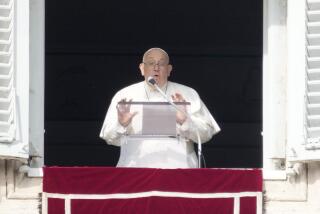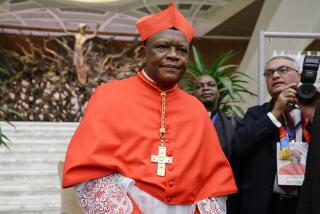Pope Stands Firm Against Divorce and Remarriage Among Catholics : Religion: Those who break vows remain in church but can’t receive Communion.
- Share via
VATICAN CITY — There can be no reprieve for divorced and remarried Catholics, the Vatican told bishops around the world Friday.
Stiffly reaffirming a traditional teaching that is disregarded by millions, the Vatican said that Roman Catholics who break their marriage vows remain within the church but cannot receive Communion even if they feel able to do so with a clear conscience.
Cardinal Joseph Ratzinger, the conservator of Vatican orthodoxy as head of the Congregation of the Doctrine of the Faith, signed the letter to bishops issued Friday, but a postscript said it had been approved by Pope John Paul II, who ordered its publication.
Vatican sources said the letter was a riposte to three liberal German bishops who said publicly last year that divorced and remarried Catholics could follow their consciences in deciding whether to take Communion.
That is not allowed, Ratzinger says, deploring “the mistaken conviction” that a divorced and remarried Catholic may decide on the basis of personal conviction about his or her worthiness for Communion.
“Such a position is inadmissible,” the Ratzinger letter says. Exceptions would be if a first marriage was canonically annulled, or the divorced and remarried Catholic repented and abstained from sex with the new spouse, according to the letter.
Issued during a Vatican synod on religious life, the letter can only exacerbate sharp differences of opinion on bedroom issues and questions of conscience between the Vatican and Catholics in the United States and other First World countries.
Just as many divorced and remarried Catholics take Communion, so do an overwhelming majority of American Catholics tell pollsters that they violate church prohibition of artificial birth control.
To receive the Eucharist, which Catholics regard as the body of Christ, is the essence of full participation at Mass. Still, the Ratzinger letter should not alienate divorced Catholics, according to the president of the U.S. National Conference of Catholic Bishops.
Rather, the letter reflects “constant teaching” of the church. It is not “a punishment or a discrimination against those who are divorced and remarried,” says a statement issued by Archbishop William Keeler of Baltimore.
Despite Keeler’s official remarks, protests are expected from rank-and-file Catholics.
“I’m standing by for the onslaught,” said one official with the Catholic bishops conference in Washington.
In Maryland, a leader of a Catholic reform group reacted with dismay. “It won’t play well, I can tell you that,” said Sister Maureen Fiedler of Catholics Speak Out. “Catholic teaching has always emphasized the primacy of conscience. I don’t see how this (Vatican) statement can destroy the primacy of conscience in these matters.”
Seventy-four percent of American Catholics questioned in 1992 by the Gallup poll said they believed that divorced Catholics should be able to receive Communion even if they do not have an official annulment from the church, Fiedler said.
But Rome has voiced growing concern as well over the number of annulments granted in the United States by church tribunals. There were 63,933 annulments granted in 1991 in the United States, compared to 80,711 in the rest of the world, according to the 1994 Catholic Almanac.
“The American church has been looked upon by Rome as at times being too liberal in the annulment process,” said the Rev. Chris Baumann, a spokesman for the Catholic bishops conference. “The fear of the church is that annulments will be looked upon as ‘Catholic divorce,’ which they are not.”
Annulments are granted only when a marriage is deemed by the church not to have been valid.
Such a finding may result if one of the spouses refused to have children or entered into marriage against his or her will. Other grounds include a serious deficiency of a real interpersonal relationship and emotional instability.
Catholics are taught that it was Christ himself who proclaimed that marriage in the church is indissoluble.
That precept offers a strong pastoral reason for banning Communion to divorced and remarried Catholics, the letter says.
“If these people were admitted to the Eucharist, the faithful would be led into error and confusion regarding the church’s teaching about the indissolubility of marriage,” Ratzinger writes.
Since the church does not countenance divorce, it does not accept any subsequent marriage.
“A new union cannot be recognized as valid if the preceding marriage was valid. If the divorced are remarried civilly, they find themselves in a situation that objectively contravenes God’s law. Consequently, they cannot receive Holy Communion as long as this situation persists,” the letter says.
The Communion ban also extends to divorced Catholics living with a subsequent partner to whom they are not married.
“Pastors and confessors . . . have the serious duty to admonish them that such a judgment of conscience openly contradicts the church’s teaching,” the letter says.
Times religion writer Larry B. Stammer in Los Angeles contributed to this report.
More to Read
Sign up for Essential California
The most important California stories and recommendations in your inbox every morning.
You may occasionally receive promotional content from the Los Angeles Times.













